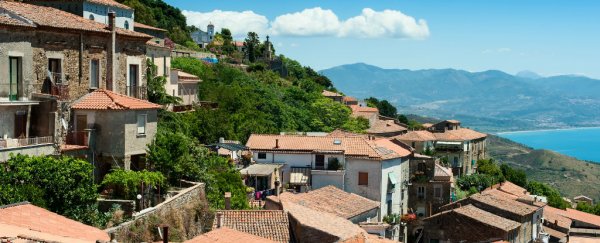On the western coast of southern Italy, where the ocean meets the sprawling mountains of Mediterranean, a tiny town called Acciaroli has been quietly thriving. With a population of around 2,000, the town is home to roughly 300 residents who have managed to live to 100 and beyond. That's a disproportionately high percentage, and no one can figure out why.
When you consider that everywhere else in the world, the percentage of centenarians is around 0.2 percent, it's clear that something pretty remarkable is going on here. And now, for the first time, researchers have been given access to Acciaroli to investigate.
"We are the first group of researchers to be given permission to study this population in Acciaroli, Italy," said one of the team, cardiologist Alan Maisel from the University of California, San Diego School of Medicine.
Maisel and his colleagues will now be heading to Acciaroli to work closely with its centenarians and figure out what makes them so different to the rest of the world's population, whether it's something in their genes, some specific lifestyle factors such as diet or excise habits, or a unique combination of the two.
"The goal of this long-term study is to find out why this group of 300 is living so long by conducting a full genetic analysis and examining lifestyle behaviours, like diet and exercise," says Maisel.
Not only do the locals have a better chance than anyone else in the world at making it to 100, but the population is also known for its low rates of heart disease and Alzheimer's.
And according to Maisel, you've also got a good chance of making it well beyond 100. "Out of those ones that are over 100, we're not sure exactly, but we think about 20 percent have reached 110 years of age," he told NPR.
Interestingly, while you'd be tempted to just explain it away with the fresh mountain air and idillic lifestyle, Maisel explains that the population isn't exactly the 'jog-every-morning/zero-vices' kind.
"What shocked me is that I don't see people jogging. I do not see people in active exercise classes. I don't see them swimming laps in the ocean," he says, adding that many of the elderly residents are smokers and overweight.
What he suspects is going on in Acciaroli is good genes, and a great diet. The population of course sticks to the local Mediterranean diet, which is heavy in heavy in fish, olive oil, and rosemary - a herb scientists have become increasingly interested in.
"[N]ot only is rosemary rich in calcium, iron, and Vitamin B, but laboratory tests also found that it is full of antioxidants and anti-inflammatory compounds; further studies suggest that rosemary can also act as an anti-tumour agent," Giulia Aloisio Rafaiani reports for the Britaly Post.
"[E]very meal they have the plant rosemary in almost everything they cook with," Maisel told NPR. "Whatever form they put it in has been shown in scientific studies to reduce cognitive and prevent cognitive dysfunction and some ageing."
Another potential key ingredient for longevity? Anchovies. "Everybody ate anchovies," says Maisel. "Now, you know, I actually like anchovies on my Caesar salad, but I never thought they would help me live to be 110. But they seem to eat it with every meal."
Maisel and his colleagues will now be setting themselves up in Acciaroli to establish a long-term study that will analyse blood samples from the villagers for genetic clues, and get a better understanding of the local diet, lifestyle, and fitness habits via surverys.
They will also examine metabolomics, biomes, cognitive dysfunction, and protein biomarkers that are linked to a risk of heart disease, Alzheimer's, kidney disease, and cancer, Amanda Onion reports for Discovery News.
"This project will not only help to unlock some of the secrets of healthy ageing, but will build closer ties with researchers across the globe, which will lead to more science and improved clinical care in our aging population," explained one of the team, Salvatore DiSomma, in a press release.
We probably won't see any conclusions for a long time, but that's a good thing - the researchers are in it for the long-haul, so we can expect some pretty valuable insights to come from this new study. We can't wait to see what they discover.
